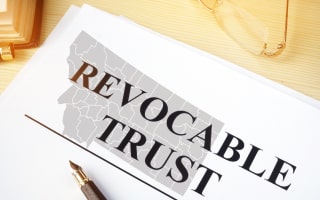How to Find Owners of Properties
in Montana

Property ownership in Montana is regulated by Title 70 of the state code. In the first chapter of Title 70, property ownership is directly defined as at least one person possessing and using a property to the exclusion of other people. Real estate in Montana can be acquired by occupancy, transfer, will, accession, or succession.
Montana accommodates numerous types of property ownership, including everything from individual ownership to joint tenancy. Properties can also be purchased and maintained by LLCs, trusts, and other legal entities. In Chapter 21 of Title 70, all the records that are drafted when a property is transferred must be stored in the county that the property is located in.
When you wish to research the property records database in Montana, accessing them isn't too challenging if you're dealing with an individual owner. However, the process can become complicated when real estate in Montana is owned by a trust or corporation.
How Do You Find Owners of a Property in Montana?

Finding a property owner in Montana is possible whether the piece of real estate is owned by a single individual or a trust. There are also numerous techniques and sources you can use to find a property owner in Montana, which are detailed below. Additionally, understanding the specific public records and databases that apply to Montana can make the process more efficient and accurate.
Registry of Deeds
A registry of deeds is a place where every recorded document about real estate is stored. When a property is sold from the current homeowner to a buyer, a deed will be recorded and stored in this database. Each county in Montana has a registry of deeds that you can access in person. The details you can input to access this information include the property address, owner's name, or parcel ID.
Most counties in Montana maintain an online database that allows the public to search for the information that's stored in a registry of deeds. Use the following links to reach your county's registry of deeds:
- Yellowstone County
- Gallatin County
- Missoula County
- Flathead County
- Cascade County
- Lewis and Clark County
- Ravalli County
Land Records Website
When you sell a property, a land record will be produced. This record is generated following a sale, mortgage, lien, transfer, easement, or lease. Every county is required to maintain land records. You should find them at your county clerk's office. They'll also be stored on the county's online property records database in Montana. You can only obtain these records if you can provide the name of the owner, the parcel number, or the property address.
City or Town Assessor's Office
In Montana, the state oversees a large portion of the assessment and taxation system. Assessments are typically performed by the county office of the Property Assessment Division. If you visit this office, you should be able to request records for any property in the county. These records include ownership documents, property maps, sales records, and tax assessment information. If you wish to claim these records, search for them online or in person.
You can learn more about the Property Assessment Division of the Montana Department of Revenue by visiting its website. Even though Montana doesn't have traditional countywide assessors, the Property Assessment Division maintains a field office in every county. You can find the address to the office in your county by visiting the Department of Revenue's website.
Tax Records
Property tax records are some of the documents that are stored at the county clerk's office or your local Department of Revenue branch. Once you obtain the tax records for a specific property, you'll learn about assessed values, tax history, and current ownership. These records are usually accessible through the county's online database.
Title Company/Agency
A title company is a third-party entity that can work on behalf of a buyer or seller. These companies have access to comprehensive county and state databases of property records. They offer a title service that involves researching a property's title to determine if any easements, liens, or ownership claims could create problems when transferring ownership. In Montana, the average cost of a title search ranges from $60-$200.
If the search doesn't yield the results you're looking for, several additional methods might help you find the name of a property owner. For example, you could ask a local real estate agent or lawyer. You could also check if any neighbors have this info. Consider searching popular real estate websites for the name of the property's owner.
![]() Commercial Services
Commercial Services
Ownership information is also available through third-party real estate websites, such as PropertyChecker.com. You can search for this information if you have the parcel ID or property address. The owner's name, phone number, or email address can also help you find property records.
Keep in mind that third-party records might not be as comprehensive as the official ones. When searching statewide records, you should uncover information about past and current owners as well as the people behind a corporation or trust that owns property. When you search with PropertyChecker.com, you'll receive the following documents:
- Building permit info
- Ownership details
- Property information, such as the lot size
- Lien records
- Deed records
- Loan documents
- Foreclosure information
- Property value details
- Property tax records
- Neighborhood info
- Sales history
What Are the Different Types of Property Ownership in Montana?

Property ownership can mean many different things. One or more parties can claim a piece of real estate in Montana. When you buy a home in Montana, you can do so by yourself, with a spouse, or as an LLC.
Understanding the many types of property ownership that are accepted in Montana can help you decide on the type of title you'd like to own. If you select the right ownership structure for yourself or your investment portfolio, you can have control over factors like access to finance, liability, and property taxes.
The most common types of property ownership in Montana are sole ownership, joint tenancy, and tenancy in common. In the following, you'll learn about each ownership title, including its implications and benefits.
-
Sole Ownership: An individual has full ownership rights to a property. Total control over the property's legacy and any decisions that must be made. Required to pay all taxes and debt related to the property.
-
Joint Tenancy: At least two people have equal shares in a Montana property. Shares can be transferred after death without going through probate. When an owner sells their interest, the joint tenancy is immediately severed.
-
Tenants by Entirety: A joint ownership structure designed for married couples. Provides survivorship rights and protection from some creditors. Couples must mutually agree to property decisions.
-
Community Property: Real estate that's purchased by both spouses during a marriage. Equal rights to sell, manage, and use the property. The home must be equally divided after a divorce.
-
Tenancy in Common: Multiple owners have shares in a property, which can be equal or unequal. Shares can be inherited or sold independently. Owners might disagree on how to sell or manage the property.
-
Condominium Ownership: Many individuals hold units in a complex. Access to community amenities and a personal living space. Likely subject to HOA guidelines and monthly fees.
-
Cooperative Ownership: Occupants have ownership of the entire property. Allows for community control and reduced purchase costs. Other members must approve before shares are sold.
-
Trust Ownership: Property is kept in a trust for one or more beneficiaries. Protects assets from creditors while also providing tax breaks. Selling and managing the property is complicated while it's in a trust.
-
Life Estate: Ownership of the property lasts until the individual passes away. During the individual's lifetime, they can use the property without restriction. Transferring an interest in the property requires approval by the remainderman.
Finding the Owner of a Trust or Corporation that Owns Properties in Montana

Along with an individual having ownership of real estate, Montana properties can also be held by limited liability companies, partnerships, trusts, and C or S corporations. When you want to learn more about a property and its owner, you can request help from a title company or a real estate attorney. This step is often necessary when a property is held by a corporation or a trust.
When identifying the owner of a property yourself, there are several options available to you. For example, you could find ownership information by researching local business directories. This information is often available in business databases like Westlaw and LexisNexis. Consider cross-referencing the public records that you have access to, such as tax records and deeds.
Finding the Owner of a Trust in Montana
You might be able to find the owner of a trust by entering the address of the property in Montana's property search database. Except for a small amount of land records, details about trust owners aren't usually recorded. You might need to request assistance from a real estate attorney who has experience in this sector.
Finding the Owner of an LLC in Montana
Montana offers a simple business search database that should immediately give you access to company-related documents for the LLC you look up. Once you enter the company's name or filing number, you should receive the documentation that includes this info.
Finding the Owner of a Corporation in Montana
Records for all registered corporations in Montana are accessible through the state's business search database. If you're having difficulty finding the company in the database, click the "Advanced Search" button to refine the parameters.
Common Methods of Property Transfer in Montana

Property deeds are documents that are generated when a piece of real estate is transferred or sold in Montana. These documents list the names of the seller and buyer as well as details about the transaction. The most common types of deeds in Montana are detailed below:
-
General Warranty Deed: This type of deed offers a complete warranty of the title. In this situation, the new owner will receive a clear title that doesn't contain any liens or encumbrances. It also protects the buyer from unknown title issues.
-
Special Warranty Deed: A special warranty deed provides a partial warranty of title. It guarantees that the title doesn't have any problems that were brought about by the current owner's actions. If a previous owner claims after the title is transferred, it will be the new owner's responsibility.
-
Quitclaim Deed: This type of deed comes with a lot of risks and is mainly used when a home is transferred between friends or family members. It doesn't guarantee that the title is free from other ownership claims. The current owner doesn't make promises about the status of liens.
Step-by-Step Guide to Property Transfer in Montana

If you're about to be involved in the selling or transferring of a property title, you should have a detailed understanding of the administrative and legal actions that occur during this process. First, you must identify the type of transfer you're taking part in. For example, you could gift the property to a family member or sell it on the market.
A title search is also required. It will tell you if there are any disputes or liens associated with the title. You may need to purchase title insurance to protect from unknown claims.
Once both parties agree to the terms, a deed will be drafted. Each party will need to sign the document in front of a notary public. After the deed is finalized, it will be recorded. Keep in mind that Montana is one of a few states that doesn't collect a transfer tax when a home is old, which should minimize your closing costs.
The deed will be recorded after all parties sign it. In Montana, the recording fee is $8 per page. Once the deed has been recorded, notify your HOA, mortgage lender, and tax authority. Update your property records to make sure that the new owner receives future tax bills.
Property Ownership Guide
- How to Find Owners of Properties in Montana
- How Do You Find Owners of a Property in Montana?
- What Are the Different Types of Property Ownership in Montana?
- Finding the Owner of a Trust or Corporation that Owns Properties in Montana
- Common Methods of Property Transfer in Montana
- Step-by-Step Guide to Property Transfer in Montana
Montana Homeowner Lookup
- Owner(s)
- Deed Records
- Loans & Liens
- Values
- Taxes
- Building Permits
- Purchase History
- Property Details
- And More!
Property Ownership Guide
- How to Find Owners of Properties in Montana
- How Do You Find Owners of a Property in Montana?
- What Are the Different Types of Property Ownership in Montana?
- Finding the Owner of a Trust or Corporation that Owns Properties in Montana
- Common Methods of Property Transfer in Montana
- Step-by-Step Guide to Property Transfer in Montana